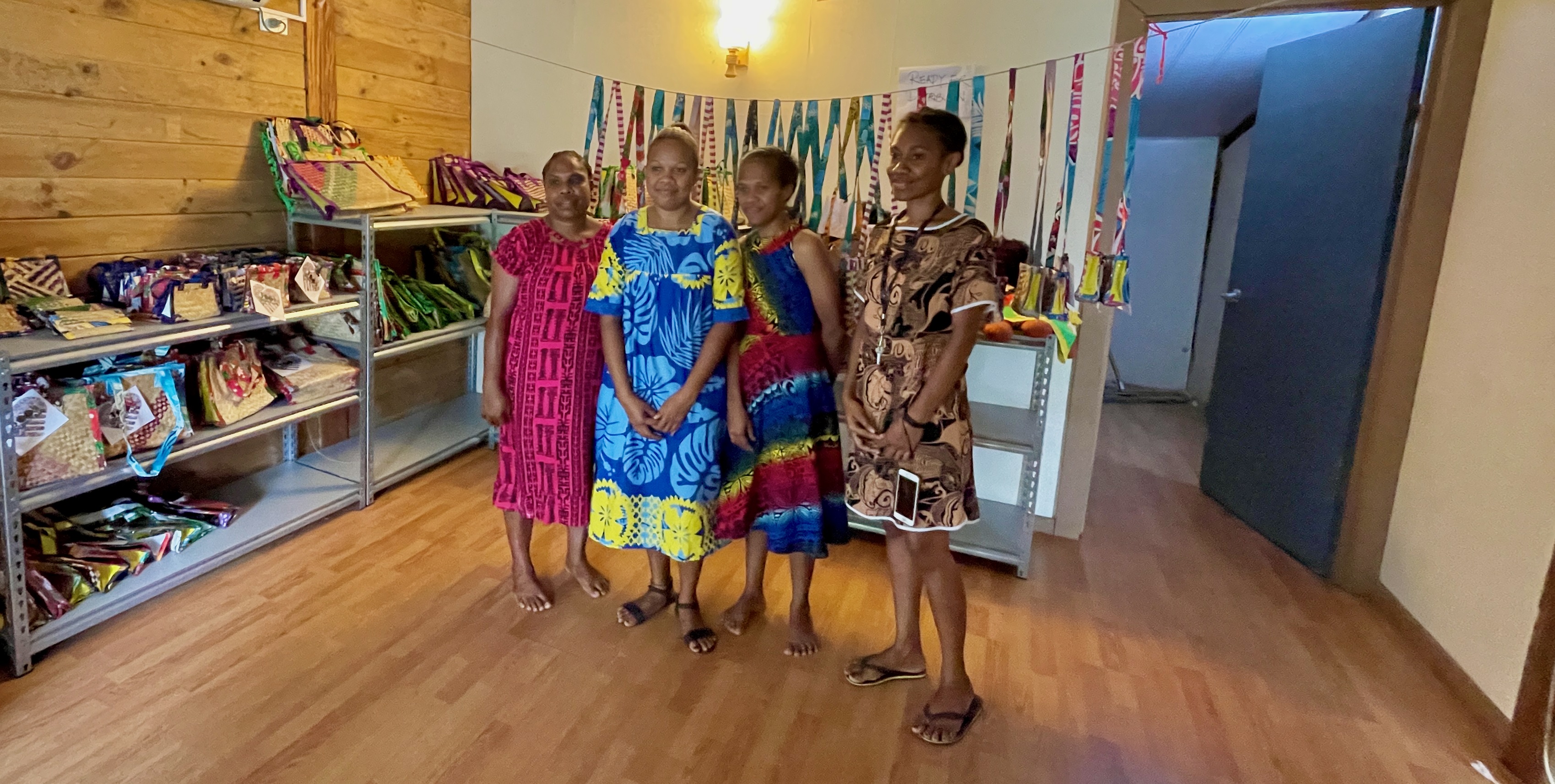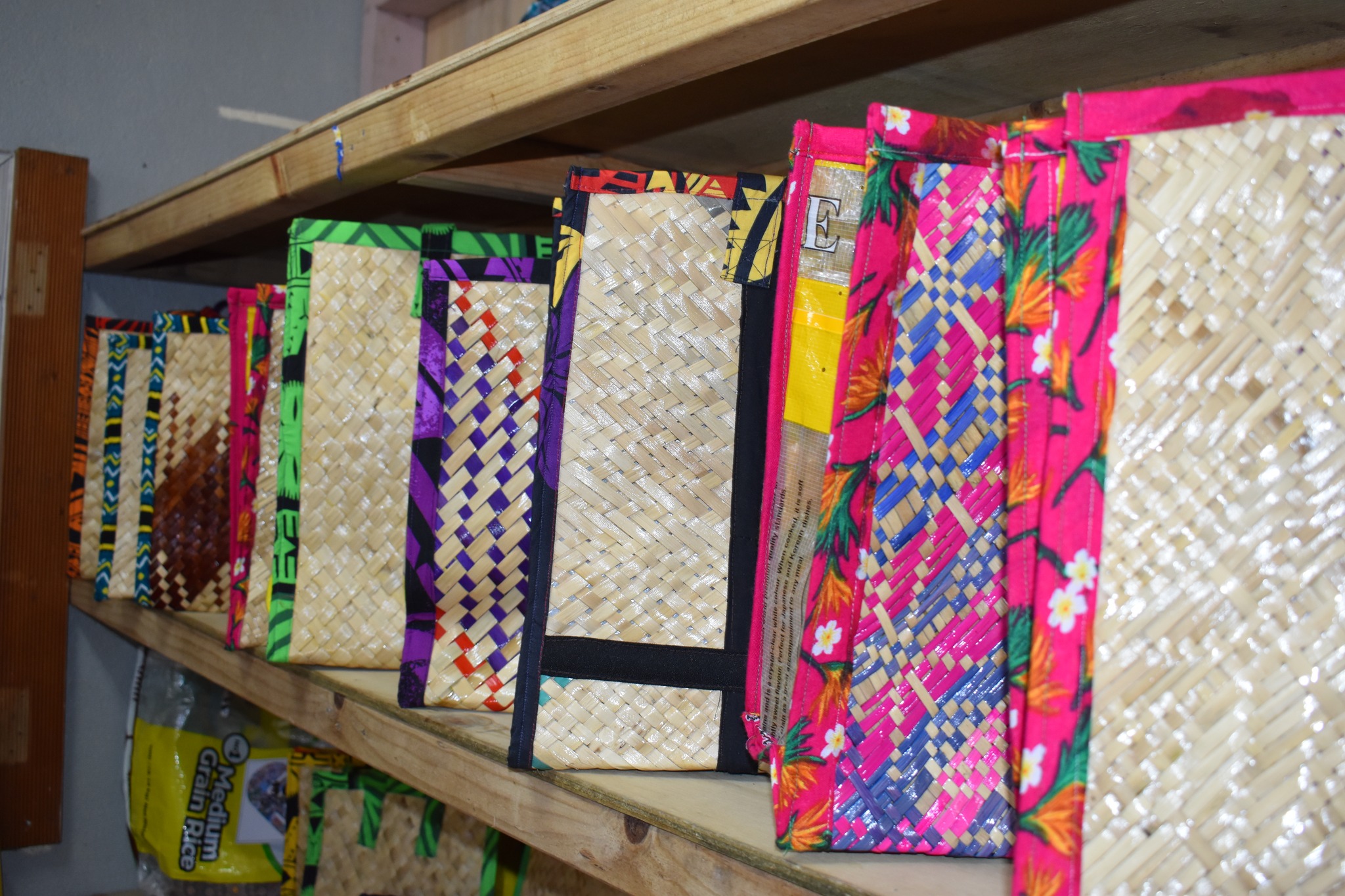Related News

The programme, now dubbed ‘Yumi Smat’ has given women and youths with disabilities, the skills and tools to make a living through their creativity and drive. Picture: SUPPLIED/SPC
By LORIMA DALITUICAMA
ON the outskirts of Port Vila, Vanuatu about 15 minutes drive away from the busy town center lives 27-year-old Tamanu Kaberi with her four children and husband. They share a large four-bedroom concrete and corrugated iron home with the rest of her husband’s family.
A walking distance from Tamanu’s home lives Pauline Hake who rents a single room flat with her elderly mother and five-year-old son. The women are employed by Yumi Smat. An innovative social business established as a COVID-19 recovery initiative for communities surrounding the country’s capital Port Vila.
“We’ll be struggling a lot. At home there’s no job and some of us just do sell-sell. Sometimes the sell-sell is good and sometimes not so good,” says Mrs Kaberi.
Yumi Smat was initially launched three years ago as “300 Coconut Bags” by the Pacific Community (SPC) through funding by the Canadian Government with an amount of
CAD41,691.69, approximately VT3.5 million ($F69,519). The initiative was a joint partnership between SPC, the Vanuatu Ocean Office, the Vanuatu Society for People with Disability, and the Ministry of Disability team.
SPC’s Melanesia regional director, Mia Rimmon, says at the peak of the pandemic, vulnerable members of communities like women and those with special needs faced extra economic difficulties.
“SPC has always had values and part of our mission is to really try to reach the most vulnerable populations in our member States,” she said.
“Being here on the ground in Vanuatu we have a lot of contact with people with disabilities and we try very hard to see how we can help to find pathways for them through some of the existing SPC programs.”
In this case, she said they started a project with the help of a Canada fund. During COVID-19, they realised that any job opportunities for people with disabilities were going to be even less than they normally were.
“So, trying to catch a few different priorities in one project we applied for a small grant and received it in order to use it on people with disabilities, who have sewing and marketing skills in manufacturing, or even no skills at all but are willing to be trained to work with us,” Ms Rimmon said.

Yumi Smat aims to help eradicate plastic pollution on the environment as well as support women, youth, and persons with special needs.
For Mrs Kaberi and Ms Hake, joining Yumi Smat has greatly improved their economic well-being. Depending on the product type, the women can make up to 3000 Vatu, almost $A40 ($F58) per item sold.
“Yumi Smat helped me to look after my family. It’s helped me to pay for the rent of the house, food at home and also the bill for the light and water,” said Ms Hake.
“A lot of us are struggling mamas at home. So, when the project started it has helped us a lot.
“It helped with my family because at home only my husband works. Now I am able to help him with our financial responsibilities. It’s also helped us to think hard and try our best to come to work every day so we can get an income,” Mrs Kaberi added.
Yumi Smat is an inclusive business and employs anyone regardless of race, gender, or ability.
Cassandra Tarivona is hearing impaired. She is also an experienced tailor who usually sells the dresses she makes in town. However, like many others, Ms Tarivona’s business hit a downturn due to COVID-19.
Luckily, she was invited to join Yumi Smat where she took on a very important role.
“When we first started sewing the bags, some of the mamas had no experience in using the industrial sewing machines.
“I assisted by teaching them how to use the machines. Once they got the hang of it, I taught them how to straighten up their linings, how to cut the bags in straight measurements.
“The benefits are that the mamas now can sew their own clothing and sell them for an added income,” says Miss Tarovona.
Recycled plastic bags and pandanus make up the main materials for the bags. When the program first started, youth groups were employed to collect discarded plastic bags for the business, in turn cleaning the environment and gaining an income.
With guidance and support from World Vision Vanuatu, the business has diversified into other products like wash mitts, sanitary mats, purses, handbags and even dolls.
An organisation that has greatly supported Yumi Smat is World Vision Vanuatu. In country co-ordinator, Alison Coleman has been a key partner in providing technical assistance to the women who operate Yumi Smat.
“The ladies are amazing and sometimes with just a little bit of encouragement, a little bit of guidance with sewing, product development has really encouraged the group to grow and blossomed into creating the range of products that they have today. At World Vision, we support girls with menstrual products.
“We worked with Yumi Smat to develop a nice waterproof bag that was beautiful, culturally appropriate, and it would safely hold products inside. Through the support of the Australian government who support our program we’re able to provide those products to young girls in communities,” said Alison Coleman.
Manager and co-founder of Yumi Smat, Glenda Balkonan, is grateful the business has brought positive impacts to the women’s lives as well as the communities they live in.
“This business will help the community as it is a significant project to get the message forward on how to have a safe environment not only in Port Vila but for the whole of Vanuatu.
“Our message is, in the future we want our environment to be safe we want our children or the next generation to be safe in the environment they will live in.
“So that’s one of our main messages in this recycling project,” said Ms Balkonan.
There are big dreams for Tamanu, Pauline, Cassandra, and the rest of the women employed at Yumi Smat, and they are hopeful that the business will continue to grow.
“The program for the futures to come, we just want the company to have more machines so we can help mamas who don’t have work, they can come in, we can train them. Then we export our products all over the world to see what we’re doing,” said Mrs Kaberi.